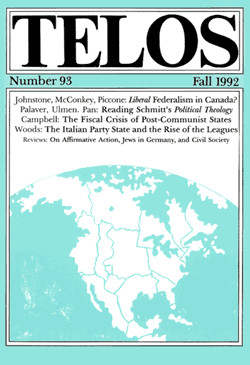As an occasional feature on TELOSscope, we highlight a past Telos article whose critical insights continue to illuminate our thinking and challenge our assumptions. Today, Juan Carlos Donado looks at Carl Schmitt’s “The Age of Neutralizations and Depoliticizations,” from Telos 96 (Summer 1993).
 Perhaps Carl Schmitt would agree: more than ever before, we live today immersed within the spirit of technicity. Coined by Schmitt, the notion of the spirit of technicity serves the analytical purpose of allowing him to distinguish between the belief in technology and technology itself. Whereas technology signals the factual development of mechanistic progress and its link to natural science, the spirit of technicity, in Schmitt’s own words, is “perhaps an evil and demonic spirit, but not one which can be dismissed as mechanistic and attributed to technology” (141).
Perhaps Carl Schmitt would agree: more than ever before, we live today immersed within the spirit of technicity. Coined by Schmitt, the notion of the spirit of technicity serves the analytical purpose of allowing him to distinguish between the belief in technology and technology itself. Whereas technology signals the factual development of mechanistic progress and its link to natural science, the spirit of technicity, in Schmitt’s own words, is “perhaps an evil and demonic spirit, but not one which can be dismissed as mechanistic and attributed to technology” (141).
So if the spirit of technicity cannot be attributed to technology, where does it originate? To answer such question, one must grasp the backbone of Schmitt’s historical sketch, for to understand the history of the European intellect, Schmitt rapidly crafts his own theory of changing central spheres. According to Schmitt, there is always a dominant central sphere that, as it were, represents the mental paradigm and intellectual prism of an age. Schmitt mentions four, linking each sphere to a century of European history—the sixteenth, seventeenth, eighteenth, and nineteenth centuries, respectively: “There are four great, simple, secular stages corresponding to the four centuries and proceeding from the theological to the metaphysical sphere, from there to the humanitarian-moral and finally to the economic sphere” (131).
At the core of this progression from sphere to sphere, Schmitt places the concept of neutralization. Interestingly enough, Schmitt claims that the change from a dominant central sphere to a new one implies the intellectual neutralization of concepts that previously could only be grasped through the prism of the past central sphere. This means that all previously essential concepts now make sense only within the situation of the new central sphere and, as Schmitt does not shy away from suggesting, it is in this new central sphere that the concept of truth is now constituted. Although Schmitt does not employ the term, one can read into the notion of neutralization a strong teleological component. It is due to this teleological force that seeks to accomplish itself in its purest of forms that, based on the technological progress essential to the economic sphere, the spirit of technicity comes to the scene.
Considering the shift from Christian theology to natural science that took place in the seventeenth century as the essential shift in European intellectual life, Schmitt is straightforward: “But the essential point for me is that theology, the former central sphere, was abandoned because it was controversial, in favor of another—neutral—sphere” (137). The indefatigable search for a new central sphere whose neutrality is constantly proven to be only temporary—thus stimulating the search for another sphere of neutrality—culminates, according to Schmitt, in an economic age where belief in technology has taken over. Schmitt articulates it with utmost clarity: “The evidence of the widespread belief in technology is based only on the proposition that the absolute and ultimate neutral ground has been found in technology, since apparently there is nothing more neutral” (138).
Concurring values flock around such belief in technology, given that peace, harmony, and reconciliation all seem to find their homeland in the appearance of absolute technological neutrality—a neutrality that grounds itself on the fact that technology serves all. But Schmitt again will flip the tables on such conception, arguing that precisely because it serves all, technology cannot be neutral. This is perhaps the closest we get to a definition of the spirit of technicity: because technology is essentially a tool, it cannot constitute itself as a central sphere severed from the politics, metaphysics, ethics, or economics that use it. To believe the contrary is to endow technology with a spirit—the spirit of technicity—that may not originate in technology, but that rather crystallizes in the psychic need to find reassurance in the appearance of absolute neutrality.
Read the full version of Carl Schmitt’s “The Age of Neutralizations and Depoliticizations” at the Telos Online website. If you are affiliated with an institution that is an online subscriber to Telos, you have free access to our complete online archive. If not, you can purchase 24-hour access to this and other Telos articles at a per-article rate. Follow the article link for more details.



